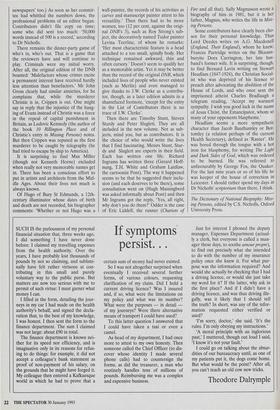If symptoms
persist.. .
SUCH IS the parlousness of my personal financial situation that, three weeks ago, I did something I have never done before: I claimed my travelling expenses from the health authority. Over the years, I have probably lost thousands of pounds by not so claiming, and sublimi- nally have felt rather virtuous at con- tributing in this small and purely voluntary way to the public purse. But matters are now too serious with me to permit of such virtue: I must garner what money I can.
I filled in the form, detailing the jour- neys in my car I had made on the health authority's behalf, and signed the decla- ration that, to the best of my knowledge, I was honest. I then sent the form to the finance department. The sum I claimed was not large: about £90 in total.
The finance department is known nei- ther for its speed nor efficiency, and is imaginative only in its reasons for refus- ing to do things: for example, it did not accept a colleague's bank statement as proof of non-payment of his salary, on the grounds that he might have forged it. My colleague then entered a Kafkaesque world in which he had to prove that a certain sum of money had never existed.
So I was not altogether surprised when eventually I received several further forms, of various colours, requesting clarification of my claim. Did I hold a current driving licence? Was I insured and, if so, what were the limitations on my policy and what was its number? What were the purposes — in detail of my journeys? Were there alternative means of transport I could have used?
To this latter question I answered that I could have taken a taxi or even a camel.
As head of my department, I had once more to attest to my own honesty. Then someone called the Chief Officer (to dis- cover whose identity I made several phone calls) had to countersign the forms, as did the treasurer, a man who routinely handles tens of millions of pounds. Reimbursing me was a complex and expensive business. Just for interest I phoned the deputy manager, Expenses Department (actual- ly a clerk, but everyone is called a man- ager these days, to soothe amour propre), to find out precisely what she intended to do with the number of my insurance policy once she knew it. For what pur- pose was the information required? And would she actually be checking that I had a driving licence, or would she just take my word for it? If the latter, why ask in the first place? And if I didn't have a driving licence, and was thus driving ille- gally, was it likely that I should tell the truth? In short, was any of the infor- mation requested either verified or used?
`I'm sorry, doctor,' she said. 'It's the rules. I'm only obeying my instructions.'
`A moral principle with an inglorious past,' I muttered, though out loud I said, 'I know it's not your fault.'
I could go on talking about the absur- dities of our bureaucracy until, as one of my patients put it, the dogs come home. But what would be the point? After all, you can't teach an old cow new tricks.
Theodore Dalrymple










































































 Previous page
Previous page